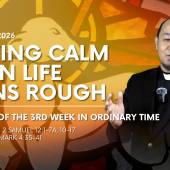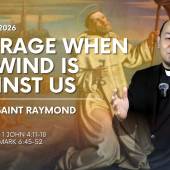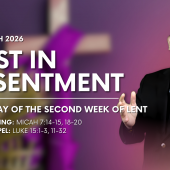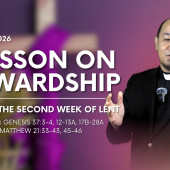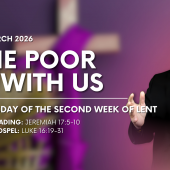Nothing lacks in the afflictions of Jesus!
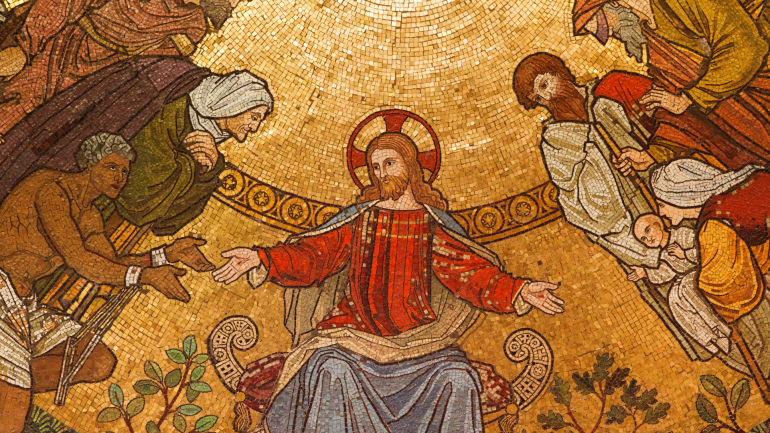
November 23, 2025 The Solemnity of Our Lord Jesus Christ, King of the Universe
Daily Readings: 2 Samuel 5:1-3; Colossians 1:12-30; Luke 23:35-43
Today is the last Sunday of the Liturgical Year. The Holy Mother Church celebrates the Solemnity of our Lord Jesus Christ, King of the Universe. It is also referred to as the Feast of Christ the King. The aim of this feast is to emphasize the true kingship of Christ and how to live our lives as true and responsible citizens of this king. Thanks to Pope Pius XI. He instituted this feast for the Universal Church in 1925.
The First Reading is taken from the Second Book of Samuel. The text narrates the anointment of David as king of Israel. It is the unanimous decision of all the tribes of Israel. The event takes place in Hebron. David too makes a covenant with all the people in Hebron. It is natural because they had already addressed him as their own bone and flesh. They have a common shared heritage. They were aware of his military prowess. Indeed David accepts divinely authorized leadership over Israel with reluctance. It is divinely willed. All the same, it is a well-known fact that there were lots tension between the houses of Saul and David. His trust in God makes him take up this significant responsibility. Thus in this event of David assuming leadership of Israel, God’s promise comes to fulfilment.
The Responsorial Psalm is chosen from one of the four Songs of Zion praising the throne and traditions of David. It is also attributed to David. The author invites the believers to go to the house of Israel with joy. David wants the pilgrims to sing joyfully. The joy of standing at the gates of Jerusalem alone is enough to cause joy in the hearts of people. They go to the Holy City to praise the name of the Lord. We have to remember that temple of Jerusalem was not there in the Citadel of David during his reign but he knew that one day his son Solomon would build it as per the wish of the Lord. He anticipates and prophesises as a chosen one of God and abundantly blessed by God!
The Second Reading is from St. Paul’s Letter to the Colossians. The text is Christological hymn. The theme of the hymn is the role of Jesus Christ in creation. The author declares that Jesus is the visible image of the invisible God. He is the firstborn of all creation. The Books of Wisdom (7:22; 9:2-4) and Proverbs (8:22-31) echo the idea that wisdom was created first and yet wisdom is an agent and partner in Yahweh’s work of creation. Jesus is the source of redemption and forgiveness of sins. St. Paul also talks Johannine language when he says that Jesus existed before all things. He holds all things together. He brings out the body metaphor of 1 Corinthians 15:35 and 37 where Jesus is considered the head of the body, which is the Church. Verse 19 is amazing. It is in Jesus “all the fullness of God was pleased to dwell”. The author explains the theme of reconciliation emphatically as peace is brought through the blood of his cross. Once upon a time the Colossians were estranged, hostile in mind and evil doers. The death of Jesus Christ made them holy, blameless and irreproachable before God. But they will have to remain steadfast in the faith without shifting from hope.
Verse 24 is questionable, “I am now rejoicing in my sufferings for your sake, and in my flesh I am completing what is lacking in Christ's afflictions for the sake of his body, that is, the church”. Nothing lacks in the death of Jesus. It is sufficient but St. Paul wishes to add his own suffering with the passion of Christ. Paul and the Christian believers are members of the body of Christ. We are invited to participate in the afflictions of Jesus due to the mystical union that exists between Jesus and his believers.
The Gospel Reading from Lukan narratives presents Jesus’ trial and a time of temptation. It is all happening on Mount Calvary. The leaders scoff at Jesus. They make fun of him. They challenge him to save himself in order to prove that he is the Chosen One and the Messiah of God. Jesus, the Second Adam is different from the first one who disobeyed God and failed utterly. He lost the status as “son of God” (Genesis 3:1-7). Jesus was tempted to turn a stone into bread (cf. Luke 4:3), to worship the Satan (cf. Luke 4:7) and to prove his Sonship by jumping down from the pinnacle of the temple (cf. Luke 4:9). Jesus, on the other hand, was firmly resolved to obey the will of God. Jesus, the Second Adam proved worthy of God.
In today’s text, Jesus is tempted once again by the bystanders (i) “let him save himself” (Luke 23:35); (ii) “save yourself” (Luke 23:37) and (iii) “save yourself and us” (Luke 23:39). All of them are founded on one eternal truth and that is Jesus is the Son of God and the chosen one. As against their demand, Jesus is truly “Son of God” and he will choose to die in obedience to God’s will. As the obedient Son of God, he will reign forever.
The inscription INRI (Iesus Nazarenus Rex Iudaeorum = Jesus of Nazareth, King of the Jews) in Hebrew, Greek and Latin languages silently proclaimed to the world that Jesus is the King of the Jews. Pilate refused the amendment proposed by the religious leaders.
There were two notable men whose attitudes and words catch our attention. Both were criminals. One derides Jesus while the other surrenders himself to him. The first one dies as a criminal while the other dies justified. He receives what matters the most, “…today you will be with me in Paradise” (Luke 23:43). It is a place where God dwells and where Jesus will be seated at the right of God, the Father. Paradise marks the end of Satan’s reign and the new beginning of renewed friendship with God. Jesus is a king who spoke about the Kingdom of God but refused the title king and shunned all the attempts to enthrone him.
Call to Action: Every believer, as a citizen of God’s kingdom has a responsibility to fulfil all his/her obligations!
Radio Veritas Asia (RVA), a media platform of the Catholic Church, aims to share Christ. RVA started in 1969 as a continental Catholic radio station to serve Asian countries in their respective local language, thus earning the tag “the Voice of Asian Christianity.” Responding to the emerging context, RVA embraced media platforms to connect with the global Asian audience via its 21 language websites and various social media platforms.









